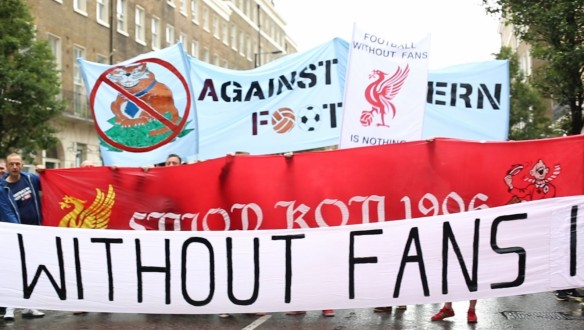By Andrew Warshaw
August 15 – The new English Premier League season gets under way this weekend amid renewed concerns over the cost of ticket prices. Yesterday the Football Supporters’ Federation organised a march towards the London headquarters of the Premier League wielding banners declaring “Football without fans is nothing” and “Demand cuts in ticket prices”.
A meeting was then held with representatives from the Premier League and the Football League to discuss affordable pricing.
Although a handful of clubs have frozen ticket prices at the same level as last season, they are still vastly more expensive than in other major European leagues at elite level.
The average Bundesliga ticket price, for instance, is €23. Last season Arsenal’s £62 away-ticket price sparked a near-boycott by Manchester City fans. But as long as grounds are sold-out or close to capacity, there seems little likelihood that prices will go down radically.
Nevertheless, Kevin Miles, the FSF’s chief executive, said: “There is an assumption that football has become a middle-class pastime, but I don’t necessarily see that. I see traditional supporters stretching themselves, paying prices they think are unreasonable, to do the thing they love. It is such a captive market, clubs can squeeze people in a way other businesses can’t.
“Clubs are unlikely to lower the cost of tickets while supporters continue to pay the current prices. Some people have stopped going and that would have a dramatic effect but why should we? It’s our game, we were here before the owners came and we’ll be here after they’ve gone. We don’t feel we should have to stop going to matches in order to affect change so we’re trying to achieve it by other ways.”
Miles’ comments are in stark contrast to the situation in Germany, where the game has deliberately been kept affordable for young supporters. The average price for this week’s German Super Cup was around £12 while a season ticket for Borussia Dortmund can be as low as £160. Compare this to, say, Arsenal where the cheapest season ticket is around £900.
“Bayern Munich makes €30-40 million less a year in ticket prices than Manchester United,” Christian Seifert, Bundesliga chief executive, was quoted as saying. “The league has no power to interfere with this. The clubs decide on their own. But some kind of commonsense prevails. In the future you cannot tell but from today’s perspective the clubs would not change their strategy. It would not be accepted.”
Seifert says German clubs could easily charge more but don’t even though their TV income is dwarfed by that of the Premier League. The Bundesliga is the second best attended sporting league in the world after the NFL, with an average crowd that is 8,000 higher than the Premier League.
“For (Dortmund’s) Yellow Wall, they could easily charge double the price but they choose to have a price that lower social classes can afford,” says Seifert. “They like to give as many people as possible the chance to go to matches. We see the Bundesliga as an important part of society.”
The ticket price debate has been further fuelled by a report which shows the gap widening between the haves and have-nots in British football.
Almost a quarter of British clubs say their finances “need attention or are cause for grave concern”, according to the accountancy and business advisory firm BDO which contacted finance directors at 67 clubs from across the English Premier League, Football League Championship, Leagues One and Two and the Scottish Premiership.
“The success of the Premier League has tended to concentrate wealth in the hands of the few at the expense of many,” says BDO’s Trevor Birch, who was chief executive for a number of leading clubs including Chelsea and Everton.
“Polarisation of the industry has to be taken as a serious issue when considering sustainability and the long-term health of the game as a whole.”
Even in the Premier League, some clubs are struggling with the dilemma of trying to progress whilst at the same time taking a realistic financial approach.
With just 48 hours to go before the start of the new campaign, Tony Pulis, who won the Premier League’s manager of the season award in May for guiding Crystal Palace from the bottom of the pack to an 11th-place finish on limited resources within just six months, quit after reportedly growing frustrated by the failure to land a number of summer transfer targets.
Contact the writer of this story at moc.l1745438639labto1745438639ofdlr1745438639owedi1745438639sni@w1745438639ahsra1745438639w.wer1745438639dna1745438639

